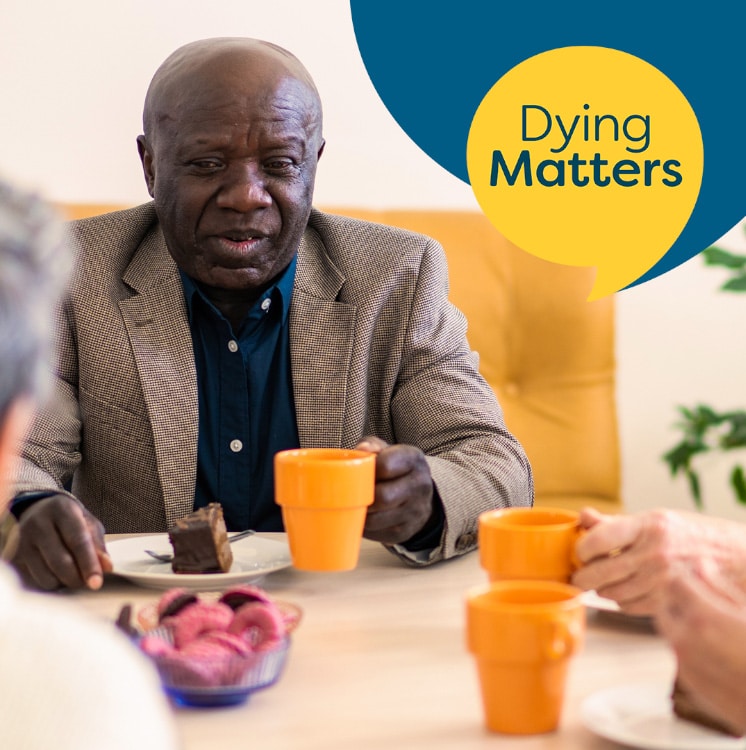Why Talking About Dying Matters: A Worcestershire GP’s Perspective
Dr Kirsten Protherough, GP, Home Visit Healthcare, Home Visiting GP Service
Every year, Dying Matters Awareness Week serves as a poignant reminder of the importance of open conversations about death and dying. As a GP with a special interest in older adult care and frailty, I’ve witnessed firsthand the profound therapeutic impact these discussions can have on patients and their families.
From my work in Worcestershire’s community hospitals with patients and their families, honest and timely conversations surrounding end-of-life care are fundamental to providing quality support and guidance to patients and their loved ones.
However, societal taboos and personal discomfort often hinder these discussions, leaving individuals feeling uninformed and unsupported during one of life’s most challenging moments.
Two insightful books that I would recommend reading are Kathryn Mannix’s “With the End in Mind” and “The book about getting older” by Dr Lucy Pollock.
Mannix’s book beautifully captures the human experience of dying, dispelling myths and fears surrounding death while emphasising the importance of compassionate, person-centred care.
Similarly, “The Book about getting older” offers valuable insights into navigating the complexities of aging and frailty, guiding healthcare professionals in providing holistic support to older adults and their families.
Common Myths surrounding “Palliative Care”
“Palliative care is only for patients in the last few days of their lives”
Palliative care is often provided at any stage of a serious illness, not just in the final days. It encompasses a range of services tailored to individual needs. Including pain and symptom management, emotional and spiritual support, assistance with decision making and coordination of care.
“Talking to my relative about dying will upset them”
Research shows that open communication about end-of-life preferences can alleviate anxiety and improve quality of life for both patients and their families. Articulating individual preferences empower patients, and despite initial misgivings, provide a sense of relief. To take an active role in shaping their end-of-life journey and ensuring their wishes are honoured often provides peace of mind to both themselves and their families.
How can carers help loved ones and patients ensure they have the best supportive care at the end of their lives?
- Ask their General Practitioner about the “Gold standards framework”
The Gold Standards Framework (GSF) was established in 1998, aimed to enhance the quality of end-of-life care for all patients, regardless of condition or setting. 95% of GP practices have GSF/supportive care registers and hold regular meetings to discuss patients who have been identified as in their last year of life to ensure their care aligns with best practice.
- Discuss the RESPECT form
The “Recommended Summary Plan for Emergency Care and Treatment” form can ensure that future care wishes are carried out, particularly if capacity is lost. It is useful to talk through this form with a healthcare professional and a trusted relative.
Legal documents
Other Legal documents like advanced directives and lasting powers of attorney for health and welfare prompt vital discussions among relatives and healthcare teams. These documents ensure that healthcare decisions in a patient’s final days reflect their wishes. By expressing preferences and designating decision-makers, patients gain control over their care, fostering transparent communication and peace of mind for all involved. These legal tools facilitate patient-centred end-of-life care, emphasizing respect for individual values and preferences.
Palliative care facilities in Worcestershire
We have fantastic palliative care facilities in Worcestershire: St Richards Hospice, Kemp Hospice and Primrose Hospice as well as the palliative care teams working within the community and Community Hospitals, including the Primrose Unit in Bromsgrove, Princess of Wales Community Hospital. Referrals to these can be made by yourself, your GP or other healthcare professionals involved in you or your loved one’s care.
The need for expert supportive end of life care is needed more than ever as we have an increasingly older population who require a different approach when coming to the end of life. An approach that enables and ensures comfort and dignity and avoiding distressing hospital admissions.
Because the way we talk about dying matters. Let’s continue to break down barriers, and foster empathy and understanding in our approach to end-of-life care. Together, we can create a more compassionate and supportive environment for all.
References:
With the end in mind – Dr Kathryn Mannix
The book about getting older – Dr Lucy Pollock
Hospices in Worcestershire
- St Richards Hospice – https://www.strichards.org.uk/
- Kemp Hospice – https://www.kemphospice.org.uk/
- Primrose Hospice – https://primrosehospice.org/
